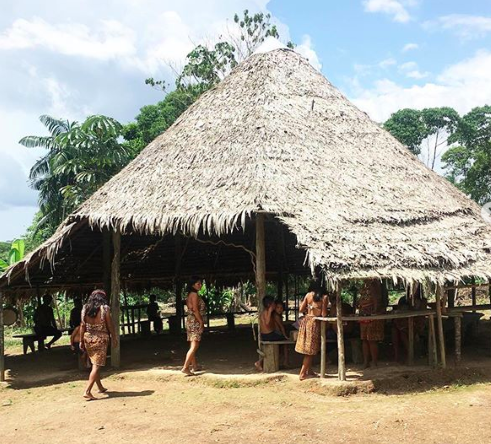Translating and Interpreting in Peruvian Amazon

As part of her degree in translation, Valeria Piña Fonseca went to the Peruvian Amazon during winter break to help Amazon Ecolodge translate documents about the living conditions of the local communities, like the Bora community in the picture.
Valeria Piña Fonseca is a MAT candidate with Spanish and English as her language combination. She is a native Spanish speaker, but after years of living in the United States and living and breathing English, she wanted to spend some time in a Spanish-speaking country that wasn’t her own (she is originally from Puerto Rico).
As a professional translator in the United States, it is important to be flexible and adapt to the reality of language and how it constantly changes. Valeria has set a goal for herself to visit as many Spanish speaking countries as she can and to learn from them. Having felt this need, she considered the possibility of spending time volunteering in Peru, and the rest is history.
As a student focusing purely in Translation, it surprised me how much interpreting I did in my immersive experience!
Before coming to the Middlebury Institute to study translation, she knew being bilingual in both Spanish and English combined with the world-renowned training at the Institute was going to give her the skills to not only be a professional, but also help a variety of communities. Her experience translating and interpreting in the city of Iquitos, Peru, opened her eyes to the possibilities and impact that being a translator and interpreter can bring. The electives she took in interpreting proved to be pivotal to succeed in different situations, and feel comfortable in the role of the interpreter.
“The team treated me like family from the very beginning.”
When she arrived and met the team she immediately got to work. It was wonderful to start working because everyone was so welcoming. Mostly she was translating documents, but she also did interpret. Valeria had the opportunity to visit local communities and translate documents both from Spanish into English and English to Spanish regarding living conditions of the local indigenous communities. These documents included agricultural records and descriptions of the sustainable tourism opportunities, which help both tourists and the local community.
Valeria also served as an interpreter to tourists and other visitors. For interpreting, everything is from memory and sometimes there were long segments and she had to remember to stop people so she could deliver her interpretation. “Sometimes I could not hear what was said (the jungle can get noisy, sometimes it would start to rain, mosquitos or ants would bite, etc.) which made me realize that as linguists we need to have incredible stamina, patience, and love for serving others, said Valeria.” There were other times when she wouldn’t know a word or a term, and she had to either ask or give an approximate explanation.
“As I originally came to MIIS to focus on becoming a professional translator, after this experience I would consider interpreting more on a regular basis.”
Valeria’s collaboration with the local communities did not finish when she left Peru, and is still translating for them. She realized the opportunities in the translation and interpretation field are endless and will continue to put her skills to use in more volunteer opportunities.
